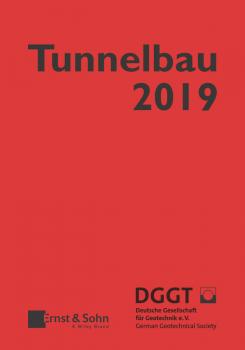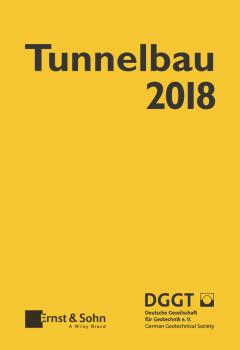Deutsche Gesellschaft für Geotechnik e.V. / German Geotechnical Society
Список книг автора Deutsche Gesellschaft für Geotechnik e.V. / German Geotechnical SocietyTunnelbau 2016
Deutsche Gesellschaft für Geotechnik e.V. / German Geotechnical Society
Das Taschenbuch fur den Tunnelbau ist seit vielen Jahren ein praxisorientierter Ratgeber fur Auftraggeber, Planer und Bauausfuhrende. Es greift aktuelle Entwicklungen und Problemstellungen auf, prasentiert innovative Losungen und dokumentiert dabei den jeweils erreichten Stand der Technik. Die Beitrage in der Ausgabe 2016 behandeln die Themenbereiche Baugruben und Tunnel in offener Bauweise, Maschineller Tunnelbau, Baustoffe und Bauteile, Forschung und Entwicklung, Instandsetzung und nachrustung, Vertragswesen und betriebswirtschaftliche Aspekte sowie interessante Praxisbeispiele. Ein Einkaufsfuhrer zum Thema Tunnelbaubedarf rundet das Buch ab.
Recommendations on Excavations
Deutsche Gesellschaft für Geotechnik e.V. / German Geotechnical Society
The aim of these recommendations is to harmonize and further develop the methods, according to which excavations are prepared, calculated and carried out. Since 1980, these have been drawn up by the working group «Excavations» at the German Geotechnical Society (Deutsche Gesellschaft fur Geotechnik DGGT) and are similar to a set of standards. They help to simplify analysis of excavation enclosures, to unify load approaches and analysis procedures, to guarantee the stability and serviceability of the excavation structure and its individual components, and to find out an economic design of the excavation structure. For this new edition, all recommendations have been reworked in accordance with EN 1997-1 (Eurocode 7) and DIN 1054-1. In addition, new recommendations on the use of the modulus of subgrade reaction method and the finite element method (FEM), as well as a new chapter on excavations in soft soils, have been added.
Empfehlungen des Arbeitskreises "Pfähle" - EA-Pfähle
Deutsche Gesellschaft für Geotechnik e.V. / German Geotechnical Society
Dieses Handbuch gibt einen vollstandigen und umfassenden Uberblick uber Pfahlsysteme und ihre Anwendungen. Der Bemessung und Ausfuhrung von Pfahlgrundungen liegen die DIN 1054 Ausgabe 2005 sowie die europaischen Ausfuhrungsnormen DIN EN 1536 (Bohrpfahle), DIN EN 12699 (Verdrangungspfahle) und DIN EN 14199 (Mikropfahle) zugrunde. Die vorliegenden Empfehlungen behandeln daruber hinaus – Einordnung der Pfahlsysteme, – Einwirkungen auf Pfahle infolge Bauwerkslasten, negativer Mantelreibung und Seitendruck, – Pfahlwiderstande aus statischen und dynamischen Pfahlprobebelastungen sowie umfangreiche Tabellen uber die Pfahltragfahigkeit von nahezu allen Pfahlsystemen auf der Grundlage von Erfahrungswerten, – Pfahlgruppen, – Durchfuhrung von statischen und dynamischen Probebelastungen sowie Integritatsprufungen, – Qualitatssicherung bei der Bauausfuhrung. Ein Anhang mit zahlreichen Berechnungsbeispielen rundet das Werk ab. Mit der Herausgabe der Empfehlungen EA-Pfahle unterstutzt der Arbeitskreis «Pfahle» der Deutschen Gesellschaft fur Geotechnik e.V. (DGGT), der in Personalunion mit dem Pfahlnormenausschuss NA 00-05-07 tatig ist, die Baupraxis bei Entwurf, Berechnung und Ausfuhrung von Pfahlgrundungen. Die Empfehlungen sind damit als Regeln der Technik in Erganzung zu den Normen einzuordnen.
Empfehlungen des Arbeitskreises "Numerik in der Geotechnik" - EANG
Deutsche Gesellschaft für Geotechnik e.V. / German Geotechnical Society
The book collects almost all the recommendations issued so far by the DGGT working group «Numerical analysis in geotechnology» in one work. For the collected publication, the recommendations have been matched, updated and in many aspects supplemented and completed.
Taschenbuch für den Tunnelbau 2019
Deutsche Gesellschaft für Geotechnik e.V. / German Geotechnical Society
Das Taschenbuch für den Tunnelbau ist seit vielen Jahren ein praxisorientierter Ratgeber für Auftraggeber, Planer und Bauausführende. Es greift aktuelle Entwicklungen und Problemstellungen auf, präsentiert innovative Lösungen und dokumentiert dabei den jeweils erreichten Stand der Technik. Die Beiträge in der Ausgabe 2019 behandeln die Themenbereiche Konventioneller bergmännischer Tunnelbau, maschineller Tunnelbau, Digitalisierung im Tunnelbau, Baustoffe und Bauteile sowie Vertragswesen, Wirtschaftlichkeit und Akzeptanz. Die Rubrik Digitalisierung im Tunnelbau wird ab Ausgabe 2019 neu eingeführt und erhält u.a. zwei Beiträge zur Anwendung von BIM im Tunnelbau. Ein Einkaufsführer zum Thema Tunnelbaubedarf rundet das Buch ab
Taschenbuch für den Tunnelbau 2018
Deutsche Gesellschaft für Geotechnik e.V. / German Geotechnical Society
Das Taschenbuch fur den Tunnelbau ist seit vielen Jahren ein praxisorientierter Ratgeber fur Auftraggeber, Planer und Bauausfuhrende. Es greift aktuelle Entwicklungen und Problemstellungen auf, prasentiert innovative Losungen und dokumentiert dabei den jeweils erreichten Stand der Technik. Die Beitrage in der Ausgabe 2018 behandeln die Themenbereiche Konventioneller bergmannischer Tunnelbau, maschineller Tunnelbau, Maschinen und Gerate, Baustoffe und Bauteile, Instandsetzung und Nachrustung, Forschung und Entwicklung sowie Vertragswesen, Wirtschaftlichkeit und Akzeptanz. Ein Einkaufsfuhrer zum Thema Tunnelbaubedarf rundet das Buch ab.
Taschenbuch für den Tunnelbau 2017
Deutsche Gesellschaft für Geotechnik e.V. / German Geotechnical Society
Das Taschenbuch fur den Tunnelbau ist seit vielen Jahren ein praxisorientierter Ratgeber fur Auftraggeber, Planer und Bauausfuhrende. Es greift aktuelle Entwicklungen und Problemstellungen auf, prasentiert innovative Losungen und dokumentiert dabei den jeweils erreichten Stand der Technik. Die Beitrage in der Ausgabe 2017 behandeln die Themenbereiche Baugruben und Tunnelbau in offener Bauweise, konventioneller Tunnelbau, maschineller Tunnelbau, Tunnelbetrieb und Sicherheit, Forschung und Entwicklung, Vertragswesen, Wirtschaftlichkeit und Akzeptanz. Interessante Praxisbeispiele und ein Einkaufsfuhrer zum Thema Tunnelbaubedarf runden das Buch ab.
Taschenbuch für den Tunnelbau 2014
Deutsche Gesellschaft für Geotechnik e.V. / German Geotechnical Society
The Tunnelling Pocket Book has for many years provided practical advice for clients, consultants and contractors. It deals with current developments and problems, presents innovative solutions and thus documents the latest state of the technology.
Empfehlung Oberflächennahe Geothermie. Planung, Bau, Betrieb und Überwachung – EA Geothermie
Deutsche Gesellschaft für Geotechnik e.V. / German Geotechnical Society
The aim of the Recommendations is the technically correct exploitation of the subsoil for geothermal purposes. It should be of assistance in avoiding impairment of soil and groundwater during the operation of the plant and buildings.
Recommendations on Excavations
Deutsche Gesellschaft für Geotechnik e.V. / German Geotechnical Society
With the issue of these recommendations, which have the character of a standard, the «Building Excavations» working group of the German Geotechnics Association (DGGT) aims to provide assistance with the design and structural calculation of excavation support works. The introduction of the Eurocodes for building control purposes made necessary a revision of the previous edition of the recommendations to comply with the requirements of DIN EN 1997-1:2009 together with the national annex DIN 1997-1/NA:2010-12 and the supplementary regulations of DIN 1054:2010-12. All recommendations were thoroughly checked, revised where necessary and adapted to new knowledge. Chapter 10 «Building excavations in water» was substantially revised. Due to the progress of development of measurement instruments and the more stringent requirements, Chapter 14 «Instrumentation for the monitoring and supervision of building excavation support works» was formulated completely anew. The recommendations of the working group «Building Excavations» should be of assistance, – to simplify the design and structural calculation of excavation support works, – to harmonise loading assumptions and calculation procedures, – to ensure the structural stability of excavation support works and their individual elements and – to improve the cost-effectiveness of excavation support works.









